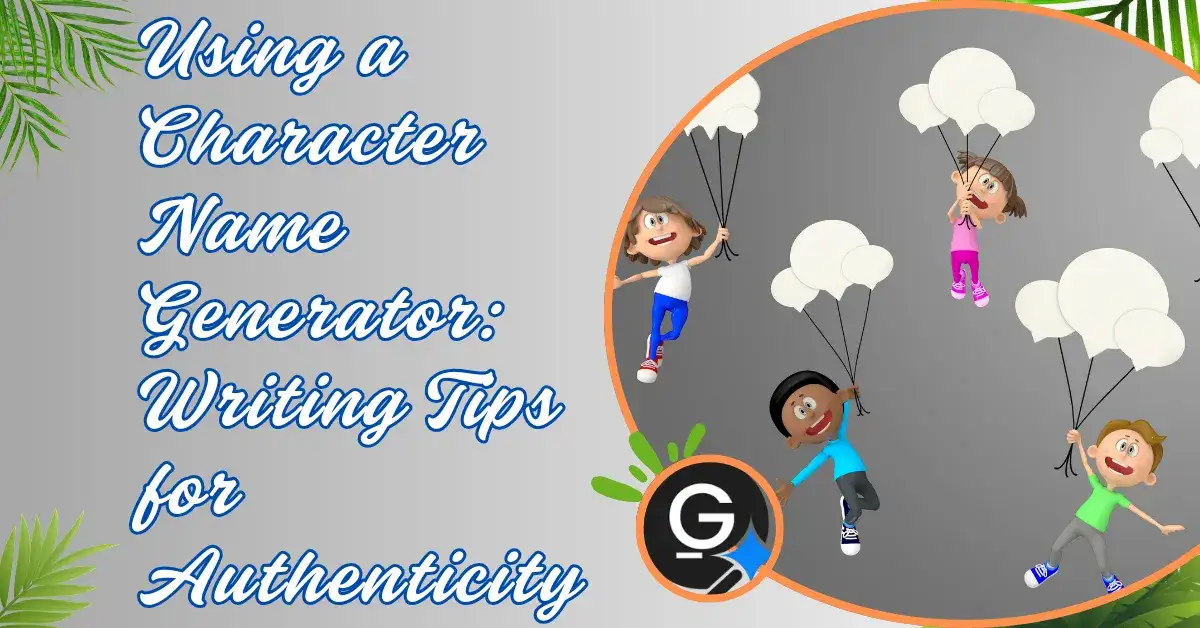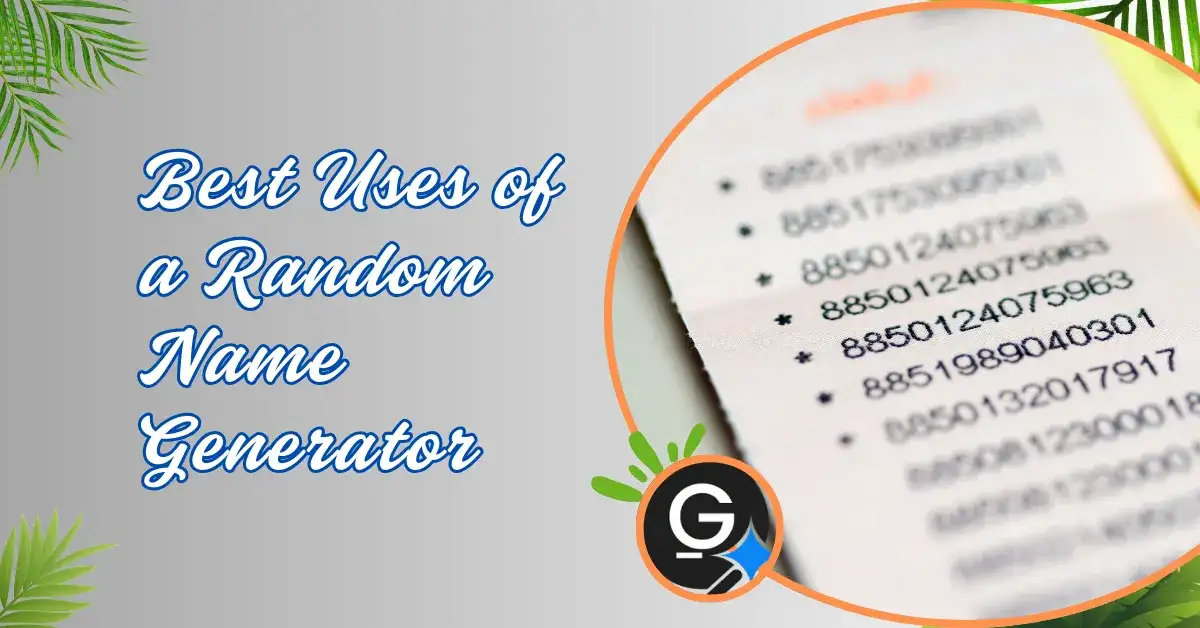Using a character name generator can be a helpful tool for creating authentic and well-rounded characters for your stories, role-playing games, or other creative activities. Here's how to effectively use a character name generator to ensure authenticity.
Importance of Naming Characters
Names represent someone elseâs hopes and aspirations for that individual, as well as providing them with an identity. Every character should possess a name, whether it's used in the story or not. Any character you wish to develop should certainly start with one.
Once you select a name, research its meaning. Numerous websites dedicated to baby names can assist you with this (you can use them if you have trouble deciding on a character's name.) Take some time to contemplate not only the literal meaning of the name but also why that character received that particular name.
If you want to learn more about your character, grab your favorite note-taking app or some paper and a pen. Write your character's name at the top of the page, and then think about these questions:
Who gave your character their name?
Why did they choose that name?
Does the name have any religious meaning?
Are there any family or cultural traditions connected to the name?
How does your character feel about their name?
Does your character have any other names, like nicknames or middle names?
If they do, who calls them by those names, and how do they feel about it?
As you can see, your character's name can reveal a lot about them, from their background to their family ties. By thinking about all these aspects, you can lay the groundwork for creating an interesting character and story.
Using Name Generators
Have you ever struggled to come up with a name for your characters? No worries, name generators are here to help you get those creative juices flowing! These online tools use randomness and creativity to generate a wide range of character names, each with its unique personality.
Exploring Cultural Meaning: Many name generators have options for different cultures. This lets you explore the richness of different languages and histories, adding depth and authenticity to your characters.
Trying Anagrams: Have you ever played around with rearranging letters in a word or phrase? Some generators do just that! An anagram can lead to unexpected and fascinating results.
Combining First and Last Names: Generators often suggest combinations that sound natural, making your character's identity more believable.
Feel free to try out these features. Allow them to spark your creativity in ways you've never experienced! Our Name Generators offer the finest selection of these options. You can use the following name generators that we have for your characterâs name. You can visit our website Generate Name and use any of the following.
We have all the options from Gender, First/Last name, starting letter, region for your character, and the number of names for the characters you want.
Factors to Remember While Using Name Generators
You're building a brand new world, one where you create characters who are unique and vivid in your imagination. However, these characters need names â those important labels that can greatly impact the bond between the reader and the character. You're not alone in facing this naming challenge; it's something all writers must become skilled at.
So, how do you go about selecting the perfect name? How can you choose something that matches your character's personality, history, or destiny? Is there a method to simplify this task?
Well, we have some great news for you! We will guide you through effective strategies, from getting to know your character better to harnessing the significance of name meanings and symbolism.
Whether you're aiming for humor or irony, taking into account the story's setting, or carefully considering real people's names, we've got it all covered. Dive in and explore how to choose that ideal character name that will truly breathe life into your story!
Getting to Know Your Character
Before you start brainstorming potential names, it's essential to truly comprehend your character. Take the time to delve into their personality, history, and the world they inhabit. Envision them vividly and let them come to life in your mind.
Is your character a brave warrior from an ancient civilization or a modern-day tech expert? Their background can be a treasure trove of naming possibilities, so dig deep into their backstory.
Pay attention to how their personality might influence their name. A strong, self-reliant individual might be well-suited to a bold name like 'Rex' or 'Blair,' while someone gentler and more introspective could be a good fit for 'Ella' or 'Theo.' Be imaginative and take your time; discovering the perfect name is part of your journey as a writer. Keep in mind that each name carries significance, so choose wisely!
Researching Names
Exploring old records, family tree databases, and names from different parts of the world can reveal some truly special and meaningful names for your characters. The process of finding names is like a thrilling adventure that lets you see how different cultures and histories have shaped the way people are named. Here's a straightforward way to organize what you discover:
Culture/Origin | Unique Names |
Chinese | Chen, Lang |
Norse | Freyja, Astrid |
Every culture has its own rules for naming, and this can add depth and authenticity to the characters you create. For example, in Japan, the family name comes first, and this is different from English naming customs. The history of names also matters; many European last names used to come from people's jobs, like Smith or Baker. So, dive deep into the past and let history give you ideas!
Considering the Place and Time
As you create your story, it's really important to think about where and when it's happening. This can have a big impact on how your characters look and act. Imagine if your story takes place in a busy, modern city like Tokyo or New York. It wouldn't make sense for everyone to have old-fashioned English names.
Think about the culture of the place when you name your characters. If your story is set in Spain, for instance, choose Spanish names that fit the local culture and language. And don't forget about the period. If your story is set in the Victorian era, classic names like Eleanor or Theodore might be a better fit.
Also, think about different groups within your setting! In a science fiction world where aliens and humans interact, you can create special naming rules for each species. This can make your world-building even more interesting. In short, let your setting be a treasure trove of ideas for naming your characters!
Name Meanings and Symbolism
You may have noticed that some of the most memorable characters in stories often have names that carry hidden meanings or symbols. This technique can give your characters more depth and make your readers curious to discover their secrets.
Think about including cultural influences in your character's names. Different cultures give specific names various meanings. You should also consider the historical significance of names. Many traditional names have fascinating histories that can either mirror or contrast with your character's personality or journey.
Below is a table that shows how culture, history, and meaning can come together when naming characters:
Culture | Historical Name | Meaning |
Roman | Julius | Bright one |
Native American | Kaya | Pure |
African | Azibo | Earth |
Japanese | Sakura | Flower |
Remember, meaningful names bring your characters to life and make them unforgettable!
Tips for Naming Fantasy and Sci-Fi Characters
When naming characters in fantasy and sci-fi stories, remember that it's not just about the words' meanings; it's about creating a whole new world. Cultural influences can be a great source of inspiration for character names. Drawing from ancient Greek or Celtic mythologies, for example, can add depth and authenticity to your story.
Another important thing to consider is how the name sounds when spoken aloud. Does it match the mood or tone you want for your character? A soft-sounding name like 'Elysia' might suggest a gentle and peaceful character, while a tough and formidable character could have a hard-edged name like 'Zarkon.' Ultimately, your characters' names should reflect their unique identities in your imagined universe.
Avoiding Name Confusion
In your fantasy or sci-fi world, it's crucial to avoid confusing names. Make sure each character's name stands out like a distinct star in the sky, easily recognizable. Think of it like putting together a puzzle where every piece has its shape and pattern.
Be mindful of cultural sensitivity when choosing names. Avoid unintentional stereotypes, and don't use names that sound too similar or start with the same letter. This helps keep things clear for your readers.
Consider using different linguistic roots to create diverse names. A character from a desert realm might have a name that sounds completely different from someone in icy tundra lands. Remember: each name should reflect the uniqueness of its bearer!
Test the Name Out Loud
Never underestimate how important it is to say the names of your fantasy or sci-fi characters out loud. This helps you know how they sound in conversations and if they truly fit your characters.
Also, think about what certain names might mean in different cultures. Some names can make people feel strong emotions or think about specific cultures. Using these names wisely can make your characters more interesting.
Try saying each name out loud and see which one feels right for your character's personality and role. This will help you pick a name that suits them.
Getting Feedback on Names
Once you've tested your character's name and made sure it sounds good, you might wonder, "What should I do next?" This is where getting feedback on names becomes important.
Start by asking your trusted friends and family what they think of the names. You'll be surprised at how their opinions can give you new ideas. Remember to be respectful of different cultures when choosing names. Do your research to make sure the name won't upset or misrepresent anyone.
Lastly, think about having a more formal process for choosing names. You could share potential names with writing groups or online forums where people who understand storytelling can give you their thoughts.
Creating a character's name is a bit like making a work of art. It might take some time to find the perfect name, but it will make your story more interesting and real.
Adjusting Names During Revisions
So, you've got feedback on the names you want to use, and now you're ready to make some changes. You jump into the pool of revisions, and keeping the names consistent is your guide. It's really important to make sure that a character's name stays the same throughout the story. Changing names can confuse readers.
Now, let's talk about using names from different cultures. When you borrow names from diverse backgrounds, be careful not to take advantage or show disrespect. Do some research on traditions and naming rules â it's like taking an imaginative trip! This way, you can genuinely adjust the names.
In the end, when you're revising character names, think of it as shaping clay. It takes time and creativity, but you should also respect the original form. Remember these tips as you shape your masterpiece!
Legal Concerns About Naming Characters
While you're deeply into your creative process, it's easy to forget about possible legal problems related to naming characters. Two important things to consider are trademark issues and being respectful of cultures when naming characters.
You should avoid using names that other people have copyrighted or trademarked. It might sound unlikely, but there have been legal battles over this. Also, being culturally sensitive is important because it shows respect for different ethnic backgrounds and their customs.
Using Real People's Names Carefully
When you want to use real people's names in your story, you need to be cautious. This can lead to legal complications, so it's crucial to be careful. Avoiding lawsuits is one thing, but being respectful when using names is equally important. Twisting or misusing names can be disrespectful to an entire culture.
Think of these names as delicate threads woven into the fabric of your story. Representing personal identities is important because it makes your characters more human and complex. However, it's important to remember that finding the balance between authenticity and appropriation can be challenging.
Imagine each character's name as a precious gemstone. Handle it with care, respect its origins, and polish it until it fits perfectly into the world of your story. This way, you can avoid causing any tension or discomfort.
Using Names to Create Humor or Irony
In the world of humor and irony, the names you give your characters can have a magical effect. They can be a powerful tool to create funny or ironic situations in your story. When you choose names cleverly, they can add a surprising layer of depth and cleverness to your characters.
Funny Name Jokes: A well-made joke in a character's name can be a never-ending source of fun. Think about characters like 'Sir Loin' in a mystery about cooking or 'Dusty Rhodes' in a wild west adventure.
Irony in History: If you name a character who is against war 'Attila' after the famous warrior king, it adds an ironic twist that readers will enjoy.
Last Name Fun: Pick last names that perfectly match your characters' jobs or actions. For example, 'Dr. Chills' for an ice cream seller create an eerie feeling.
Names that Don't Match: Combine mild first names with strong last names to create humor through the difference, like 'Mildred Savage'. This approach keeps readers interested and makes them laugh every time they read the character's name.
Importance of Nicknames in Creating Characters
Have you ever thought about how nicknames can bring your stories to life? Well, they are incredibly important in creating characters. They help shape how people see the character, add complexity, and make your characters more interesting. Nicknames can reveal personal qualities, past experiences, or where the character stands in their social group.
Using nicknames isn't just about choosing cool-sounding words. It takes creativity and an understanding of different cultures to create characters that people from all over the world can relate to. Remember, a carefully chosen nickname can add depth to your story!
Choosing the Perfect Name
Finally, after looking at how nicknames play a role in developing characters, let's talk about picking the right name for your character. This is like the final touches an artist adds to their masterpiece.
Keep in mind, that a well-selected name can make or break how believable your character is. It's not just about finding a name that sounds nice; it should reflect your character's personality, backstory, and the influences of their culture.
Things to Avoid while Using Name Generators
Using fun and unique names in stories isn't just for fun; it also helps readers remember who's who in the story. Instead of naming the plumber "Bob," you can make him more memorable by giving him a unique background, like a cool hat, and an interesting name like "Palvesygen Glato." This way, when he reappears later in the story, even after 50 pages, readers won't forget him. But be careful; there are some things to watch out for.
Let's say you're writing your very first paranormal romance, and you like the name Damien. Well, guess what? So does everyone else! If you've done your research and read lots of books in the same genre, you probably noticed that certain names keep popping up. It's essential to be original in your character naming.
When choosing names for your characters, try to be historically accurate. Avoid using apostrophes in character names, especially in fantasy stories. Ask yourself, can you easily pronounce the character's name? If it's challenging for you, it'll be tricky for your readers too. You don't want your readers stumbling over character names.
Also, consider how the character's name sounds when spoken aloud. Is it pleasant to the ear? Is it suitable for repetition, especially if your book becomes an audiobook? And does it sound ridiculous if exclaimed, especially in steamy scenes? This could be crucial for your novel.
Avoid naming characters after people you know. This could unintentionally offend someone, and you probably don't want to associate real people with your character's actions, which could lead to legal issues.
Similarly, avoid naming characters after famous individuals or using names that strongly resemble famous figures. Names carry associations that can be hard to shake, even if your character has a completely different personality. So, if your "Severus" brings to mind a certain hook-nosed, stringy-haired professor from a famous children's series, your readers will make the same connection.
Adding an extra letter to your character's name to make it unique might seem tempting, but be cautious; someone like J.R. Ward might have already done it.
Lastly, try not to use the same starting letter for multiple character names, as it can confuse readers. For example, if you have characters named Taylor, Teagan, Ty, and Travis, readers might mix them up.
Avoid pairing your hero and heroine with famous couple names. It might not be as cute as you think, and it could lead to groans from your readers. For example, Laurel and Hardy were a famous comedy duo in American cinema history, so it's best to steer clear of such clic



